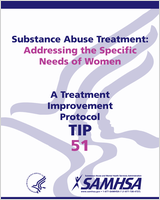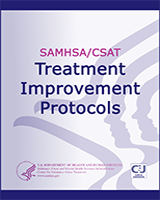NCBI Bookshelf. A service of the National Library of Medicine, National Institutes of Health.
This publication is provided for historical reference only and the information may be out of date.
Despite decades of progress, individuals from all walks of life, in urban, suburban, and rural communities, continue to use and abuse legal and illegal drugs. This report focuses on the drug treatment, medical care, and followup services needed by one special population -- pregnant, substance-using women.
Because this Treatment Improvement Protocol is particularly designed to assist drug treatment programs that receive Block Grant funding through their State substance abuse agencies, the emphasis here is on women served in the publicly funded drug treatment system. Such women are often poor and suffering from multiple socioeconomic problems. This emphasis should in no way obscure the fact that many affluent women also experience alcohol and drug problems. Those women who receive medical care through their private providers also need treatment for alcohol and other drug abuse. These guidelines are relevant to these women as well.
Contents
- What Is a TIP?
- Consensus Panel on Pregnant, Substance-Using Women
- Foreword
- Introduction
- Chapter 1—Alcohol and Other Drug Treatment Guidelines for Pregnant, Substance-Using Women
- Chapter 2—Medical Guidelines for Pregnant, Substance-Using Women
- Overview
- Guideline 8—Prenatal Intake
- Guideline 9—Prenatal Followup
- Guideline 10—Labor and Delivery for Women Who Have Received Prenatal Care
- Guideline 11—Labor and Delivery for Women With No Prenatal Care
- Guideline 12—Postpartum Care
- Guideline 13—Obstetrical Care for HIV-Infected Women
- Guideline 14—Drug-Exposed Neonates
- Guideline 15—Urine Toxicology Considerations
- Guideline 16—Nutritional Considerations
- Chapter 3—Legal and Ethical Guidelines for the Care of Pregnant, Substance-Using Women
- Appendix A—Training Guidelines for Programs
- Appendix B—Assessment Instruments
- Appendix C—Continuum of Care Model Program
- Appendix D—Quality Assurance Monitoring
- Appendix E—Glossary of Terms
- Appendix F—References
- Appendix G—Federal Resource Panel on Pregnant, Substance-Using Women
- Appendix H—Contributors
- Appendix I—Comprehensive Care Flow Charts
This publication is part of the Substance Abuse Prevention and Treatment Block Grant technical assistance program. This publication was written under contract number ADM 270-90-0001 from CSAT. Richard Bast served as the Government project officer.
The opinions expressed herein are those of the Consensus Panel members and do not reflect the official position of the Substance Abuse and Mental Health Services Administration (SAMHSA) or any other part of the U.S. Department of Health and Human Services (DHHS). No official support or endorsement of SAMHSA or DHHS is intended or should be inferred. The guidelines proffered in this document should not be considered as substitutes for individualized patient care and treatment decisions.
- Adolescent Pregnancy Guidelines.[J Obstet Gynaecol Can. 2015]Adolescent Pregnancy Guidelines.Fleming N, O'Driscoll T, Becker G, Spitzer RF, CANPAGO COMMITTEE. J Obstet Gynaecol Can. 2015 Aug; 37(8):740-756.
- Family planning clinic services in the United States: patterns and trends in the late 1990s.[Fam Plann Perspect. 2001]Family planning clinic services in the United States: patterns and trends in the late 1990s.Frost JJ, Ranjit N, Manzella K, Darroch JE, Audam S. Fam Plann Perspect. 2001 May-Jun; 33(3):113-22.
- Qualitative exploration of facilitating factors and barriers to use of antenatal care services by pregnant women in urban and rural settings in Pakistan.[BMC Pregnancy Childbirth. 2016]Qualitative exploration of facilitating factors and barriers to use of antenatal care services by pregnant women in urban and rural settings in Pakistan.Nisar YB, Aurangzeb B, Dibley MJ, Alam A. BMC Pregnancy Childbirth. 2016 Mar 1; 16:42. Epub 2016 Mar 1.
- Review Impact of federal Substance Abuse Block Grants on state substance abuse spending: literature and data review.[J Ment Health Policy Econ. 2003]Review Impact of federal Substance Abuse Block Grants on state substance abuse spending: literature and data review.Cowell A, McCarty D, Cowell A. J Ment Health Policy Econ. 2003 Dec; 6(4):173-9.
- Review Reproductive health and blurred professional boundaries.[Womens Health Issues. 1996]Review Reproductive health and blurred professional boundaries.Chavkin W, Breitbart V. Womens Health Issues. 1996 Mar-Apr; 6(2):89-96.
- Pregnant, Substance-Using WomenPregnant, Substance-Using Women
- SRS6947411 (1)SRA
- SRS1669155 (1)SRA
- Dacryodes sp. B2 KGD-2012 voucher B437016 ribulose-1,5-bisphosphate carboxylase/...Dacryodes sp. B2 KGD-2012 voucher B437016 ribulose-1,5-bisphosphate carboxylase/oxygenase large subunit (rbcl) gene, partial cds; plastidgi|924648602|gb|JQ625784.2|Nucleotide
Your browsing activity is empty.
Activity recording is turned off.
See more...

